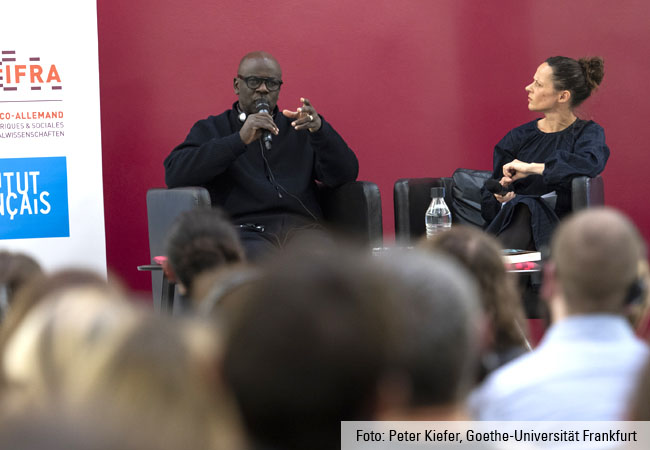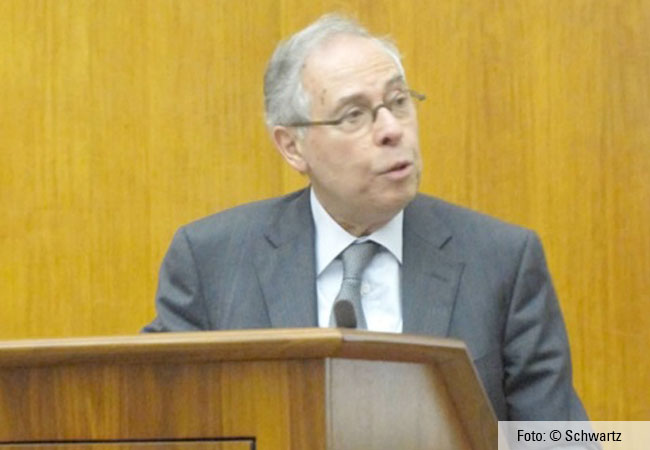The American people have voted, and Donald Trump secured a clear majority of their votes. The Republicans will also have a majority in both the House of Representatives and the Senate. How will the election result impact the global balance of power? Below, Goethe University experts in American studies, political science, economics, history and law provide a brief assessment of how they view the situation.
Prof. Andreas Nölke, Professor of International Relations and International Political Economy

From the perspective of political economy, the election of U.S. President Trump will reinforce a number of developments that were already emerging in recent years. From a comparative political economy viewpoint, the import tariffs planned by President Trump will continue to restrict the opportunities for developing export-oriented growth models. There is no other major economy with such a strong focus on exports as Germany. If we fail to stimulate domestic demand – for example by significantly increasing private and public investment – the ailing German economy will deteriorate even further.
International political economy mostly focuses on the structures of the global economy. Today, these structures are dominated by a fundamental interdependency between the U.S. economy with its considerable foreign trade deficit on the one hand, and several other economies with their export surpluses on the other. The U.S. trade deficit can only be as large as it is because the U.S. dollar remains attractive as an investment currency. President Trump is planning to expand the United States’ already huge public debt. This, together with his attacks on the Federal Reserve, could be a long-term factor undermining global confidence in the dollar – and with it the current structure of the global economy. And this against the backdrop of the long-term erosion of the dollar’s role as a currency of global trade, owing to factors such as U.S. financial sanctions.
Then there’s historical political economy, which examines the long-term trends of economic thinking and the related institutional practices. In this context, the Trump administration will foster a trend – which dates back to the 1980s – of reducing the dominance of liberal post-nationalist economic institutions, and replacing them in the medium term with an era in which much more attention is paid to securing national sovereignty.
Prof. Werner Plumpe, Professor of Economic and Social History

Once the election campaign dust currently blurring our perception of the situation in the U.S. and, in particular, of Donald Trump’s political vision, has settled, we will find that Trump is following a certain tradition in American politics – one that is interested above all in a flourishing domestic economy and takes a detached and instrumental view of international relations. Trump’s unconditional propagation of “America first” will force his partners and competitors to reconsider what they can offer as business locations, because they cannot beat the U.S. in an economic battle – at least the Europeans cannot.
U.S. import tariffs designed to persuade European companies to relocate their production to the U.S. cannot be rendered ineffective by other retaliatory tariffs, because ultimately Europe is more economically dependent on the U.S. than vice versa. Trump’s promotion of business at home, quite apart from whether it will be in any way successful given the notoriously inadequate U.S. education system, will not only force European countries to increase their defense spending – thereby relieving America –, but also to rethink what conditions they offer for doing business, and to finally answer the question of whether – in view of declining productivity and low technological innovative power – they can afford their expensive social systems in the long term. After all, in addition to a very costly energy policy, Europe as a business location is burdened by the high levies introduced by European states to secure their social welfare programs. As long as we were leaders in technology, we could afford this expenditure because customers were prepared to pay the high prices for the “Made in Germany” predicate that made this possible. That is no longer the case, and in parallel to this decline, competition between the U.S., China and Europe as business locations continues to grow. Not only will Trump whisk away the veil of supposed “Western” solidarity masking this competition to be the best business location; he will force all states to take a long, hard look at themselves and to concentrate on what really counts.
At any rate, clinging to slogans is hardly going to help, especially as Trump is not the anti-democratic ogre consuming everything in his path that he’s made out to be in Europe. The heterogeneous political world of American federalism will see to that, should he ever try otherwise. Rather, there will have to be a return to “Realpolitik,” to borrow a term from the 19th century.
Prof. Ute Sacksofsky, Professor of Public Law and Comparative Law

An American friend of mine e-mailed me immediately after the election, saying, “Now we’re just waiting for the Reichstag fire…” What’s truly frightening is that Trump doesn’t even need an enabling act for much of what he’s planning. With majorities in the House of Representatives and in the Senate, Trump wields an incredible amount of power. The fact that he doesn’t have the majorities required to change the constitution is of little comfort – he is, after all, not known to care much for legal strictures. Trump presents himself as a strong man, he wants to be a “dictator” (if only for a day). He promises to “fix” everything once and for all; during the campaign he called on the Christian right to cast their votes this time round, assuring them that in four years’ time they “wouldn’t have to vote anymore.” Even if one discounts many of these statements as bragging or hot air, the only way to respond to anti-democratic tendencies is through effective control mechanisms – a responsibility that lies first and foremost with the judicial system.
Yet, this is where we can see the lingering impact of Trump’s first presidency. Some extremely conservative judges, who were appointed by him, sit on the U.S. Supreme Court, the world’s oldest constitutional court. The rulings of recent years reveal the huge extent to which the Supreme Court backs Trump’s agenda. By overturning the previous, more liberal, ruling on abortion, the Supreme Court gave a significant boost to the cause of the anti-abortionists. But it’s not only women’s rights that are affected: among others, the Supreme Court has reinforced the right to bear arms, restricted the options for environmental conservation measures and given (Christian) religion a greater role in governmental institutions. Above all else, the court has granted the president immunity for all official acts (a term that can be widely and broadly interpreted). So, in addition to having no material limits on what he can do, Trump now also no longer has to fear any personal consequences for overstepping limits. Which is extremely worrying for and to Trump’s political opponents – just think back to McCarthy – as well as migrants, whom he wants to forcibly deport with the aid of the military. The struggle against racism and the patriarchal gender order will also suffer considerable setbacks – just witness the behavior of the men surrounding Trump. True, the Capitol is not on fire, but this is anything but good news.
Prof. Johannes Völz, Professor of American Studies

Defeated by Donald Trump, the U.S. Democrats disagree on what actually happened. There have been many attempts at an explanation. One widespread theory states that Kamala Harris campaigned on the wrong issues. Instead of focusing on people’s financial hardship, especially of those on low incomes, she concentrated on saving democracy and the law on abortion. After the election defeat, Senator Bernie Sanders delivered a damning verdict on Harris’ campaign team and the Democratic Party: “It should come as no great surprise that a Democratic Party, which has abandoned working-class people should find that the working class has abandoned them.” Put differently, the Democrats should return to being a party focused on the needs of “the little guy.” However, that is something the Democrats stopped being a long time ago. The extent of their defeat may have been surprising, but it confirms a trend that has been apparent for two decades: While the Democrats have increasingly become a party of the urban elites, Trump is the favored candidate of people without a college or high school education. There are several insights to be gained from taking a sociological approach to this education gap.
Education is often directly ascribed to a social class, its level serves as an indicator of who is poor and who is rich. But the differences in education only became a political factor in U.S. politics because they constitute the basis of the country’s social status hierarchy. We can observe a type of polarization that has permeated the social fabric of the U.S. and cannot simply be reversed by resolutions at party conventions or new social legislation programs. The Democrats have an image problem. Michelle Obama once encapsulated this when she said, “When they go low, we go high.” As long as this attitude remains, populism will continue to flourish.
Prof. Volker Wieland, Professor of Economics, specializing in the Monetary Economy

Donald Trump won a landslide victory in the U.S. presidential election. The Republicans took the majority of the seats in both the Senate and the House of Representatives. It doesn’t get any clearer than that. That’s democracy, even if we might not like the outcome itself. The U.S. democratic system has been functioning for more than 200 years with its presidential system’s specific checks and balances. We can see this right now by the fact that Trump cannot actually appoint whomever he likes to any ministerial post. The nominees must be confirmed by the Senate, and the Republican Party’s members are not known to be “yes-folk”, who wave every candidate through.
While it is true that Trump will definitely be able to push through many of his projects to a large extent over the next few years, it does seem somewhat strange to see German media proclaiming the imminent end of American democracy. It is, after all, not that long ago that the Americans first had to win a world war in order to then force democracy on Germany. Questions as to why Trump won the vote receive many answers, but dissatisfaction with economic developments under the Biden-Harris administration, including and in particular with the high levels of inflation, has emerged as the most important reason. It didn’t help Kamala Harris that inflation has meanwhile come down again. She also wasn’t saved by the fact that the inflation-caused loss in purchasing power has today been more than compensated for and that both the average available income and the median hourly wage have grown in real terms. People hate inflation and the majority of Americans voted against the economic policies of Biden and Harris.
Recent research into the causes of the 2021 inflation spike comes to the conclusion that the Biden-Harris administration’s extremely expansive fiscal policy was a key contributor. With the 2020 CARES Act, Trump had already instituted large-scale direct payments to American citizens. With the American Rescue Act, the Build Back Better Act and the Inflation Reduction Act, Biden wanted to “trump” him in several ways at once. As a result, inflation began to rise sharply, as early as 2021. For a long time, the Federal Reserve did not react and left the interest rates unchanged at their lowest level. Until the spring of 2022, when the energy price shock wave emanating from Russia’s attack on Ukraine sent interest rates skyrocketing. But it was the Biden-Harris administration itself that laid the foundation for its own electoral defeat. This should serve as an incentive to the next German government that a return to substantial and lasting economic growth will require it to adhere to the rules governing public debt, launch supply-side-oriented structural reforms, restrict excesses of the welfare state, and dismantle excessive regulation and bureaucracy. That’s the only way to develop a position of strength that will enable us to meet Trump as equals and successfully address the challenges we face in the areas of defense, infrastructure and decarbonization.
Prof. Simon Wendt, Professor of American Studies

From a historical perspective, Donald Trump’s 2024 election victory does not come as a surprise. Against the background of a conservative countercurrent following the successful social movements of the 1960s and 1970s, the Republican Party has had the voters’ ears for many years now. Stirring up fears about crime and immigration, coupled with an economic policy of low taxes and deregulation already helped past presidential candidates like Richard Nixon and Ronald Reagan achieve huge election victories. The destabilizing effects of the end of the Cold War and the impacts of globalization – which many consider negative – also drive a conservative mindset, offering fertile ground for Donald Trump’s “America first” message. In light of such conservative continuities, the presidencies of Bill Clinton (1992–1998), Barack Obama (2008–2016) and Joe Biden (2020–2024) should be considered exceptions made possible only by either a more conservative policy (Clinton) or unpopular decisions of their predecessors (Obama and Biden).
While many Americans support liberal policies that emphasize aspects such as anti-racism, gender equality and opportunities for immigrants, the 2024 U.S. election once again offers proof that a slender majority of the population rejects these kinds of ideas, or else regards them as less important than their own financial situation. It is in this context that the Democratic Party has been losing more and more voters among those categorized as belonging to the working class since the 1960s. Donald Trump’s election victory represents the nadir of this shrinking voter base and should make the Democrats sit up and consider the situation carefully. If this group of voters remains in the Republican camp on a permanent basis, it will be difficult for the Democratic Party to return to the White House again in the future.













